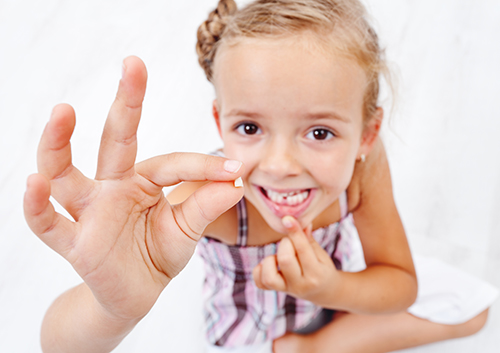February 21st, 2017

While the last baby teeth generally aren’t lost until age ten or 11, most children stop believing in the tooth fairy by the time they're seven or eight. Of course, children are more than happy to play along with the game when there’s money at stake! While it is impossible to know what the tooth fairy does with all those teeth (are they labeled and stored like museum pieces in a giant fairytale castle?), it is possible to trace the history and myth of the tooth fairy to several cultures and traditions. Dr. Carl Meyers and our team learned about some interesting myths about the tooth fairy!
The Middle Ages
Legend has it that Europeans in the Middle Ages believed a witch could curse someone by using their teeth, so it was important to dispose of baby teeth correctly. Teeth were swallowed, buried, or burned. Sometimes baby teeth were even left for rodents to eat. Despite being pests, rodents were valued for their strong teeth; it was generally believed a tooth fed to a rodent would lead to the development of a healthy and strong adult tooth.
Eighteenth Century France
The tooth fairy myth began to show more characteristics of a conventional fairytale in 18th century France. La Bonne Petite Souris, a bedtime story, tells the strange tale of a fairy that changes into a mouse to help a good queen defeat an evil king. The mouse secretly hides under the evil king’s pillow and defeats him by knocking out his teeth.
Scandinavian Lore
So, why does the tooth fairy leave money under the pillow? The idea of exchanging a tooth for coins originated in Scandinavia. Vikings paid children for a lost tooth. Teeth were worn on necklaces as good luck charms in battle. While the idea of exchanging a tooth for coins quickly spread throughout the rest of Europe, a fierce, horn-helmeted Viking is far cry from the image of a fairy collecting teeth.
While the tooth fairy as children know her today didn’t make an appearance until the 1900s, tooth myths and rites of passage have existed in numerous cultures since the dawn of time.
February 14th, 2017

Toothaches in children can be tricky ordeals that cause distress for both the child and the parent. You may feel helpless and frustrated because you cannot pinpoint the location of the pain. It is so hard to see your little one experience discomfort and feel like there is nothing you can do about it. But there are ways you can help. Try these tips the next time your child has a toothache.
Zero in on the Painful Area
The first thing you need to do is find out where the pain is coming from. If your child is old enough, ask him or her to point to the painful area. In younger children, look for swelling and redness on the gums and cheek, dental caries (discolorations on the tooth), or broken teeth. Try to get as close to the location of the pain as possible so you can determine an effective course of action to relieve it.
Try to Find the Cause
Not all toothaches are actually toothaches. A child can bite his or her tongue or cheek, have sore gums, or develop ulcers in the mouth. Teeth that are coming in can also be quite painful. If a tooth is discolored, broken, loose, or has spots that are either darker or lighter than the rest of the tooth, those could be causes of pain.
Five-Step Approach to Dental Pain Relief
- Floss. Help your child floss to remove any food particles that may be wedged between the teeth and could be causing pain.
- Rinse with warm salt water. Use a warm salt-water solution and have your child rinse well by swishing or holding the salt water over the painful area.
- Use a cold compress. This can relieve pain and swelling. If there is no swelling, you can try it anyway to subdue the pain. Try it on for about 15 minutes, then off for 20.
- Give the child ibuprofen or acetaminophen. Use the appropriate dosage for your child’s age and administer it regularly as directed.
- See Dr. Carl Meyers. If you determine that the tooth or gum is damaged, or if the pain simply cannot be relieved, call our West Bend, WI office.
If your child is experiencing throbbing pain, fatigue, or fever, you should call your pediatrician as soon as possible. If your child is experiencing mouth pain accompanied by trouble breathing or swallowing, it can indicate a more serious situation and you should take your son or daughter to the emergency room.
Most mouth pain in children can be remedied with the simple steps here. The important thing is that you remain calm, no matter what. You child is taking cues from you and if you panic, he or she will panic.
February 7th, 2017

People who have diabetes are usually familiar with many of the other health risks they face, including damage to the nerves, eyes, heart, and kidneys. But did you know that if you have diabetes you also have a much greater chance of developing gum disease? It's true, and like other diseases related to diabetes, the risk potential severity of gum disease is directly related to how well blood sugar is controlled.
The Causes
In diabetics, there are two primary mechanisms that increase the risk of developing gum disease, also called periodontal disease:
- Bacterial growth: Bacteria love sugar including the glucose found in blood and bodily fluids. Elevated levels of sugar in saliva can provide a very hospitable environment for bacterial growth. The risk may be elevated if your gums bleed.
- Circulatory changes: In diabetes, the blood vessels become thick, making it more difficult for blood to carry oxygen to the gums and to carry away harmful waste products. This decrease in circulation can weaken the mouth's natural resistance to decay. If you smoke, circulation can become even more compromised, significantly increasing your risk of periodontal disease.
Preventing Gum Disease
If you're diabetic, the number-one key to preventing gum disease is to make sure you do all you can to keep your blood sugar under control. In fact, studies show diabetics who have excellent control of their blood sugar levels have no more risk for gum disease than those who don't have diabetes. Here are some other tips to keep your gums healthy:
- Floss your teeth gently, curving the floss so it can gently reach just below your gum line to remove plaque and food particles. Rinse your mouth when you're done flossing.
- Use a soft-bristle brush to brush teeth twice daily, using small circular motions. Avoid pressing too hard on tooth surfaces.
- Brush your tongue gently to remove germs that can hide there.
- Use an anti-bacterial mouthwash to kill germs that are hard to reach.
- Keep track of how well your blood sugar is controlled and let Dr. Carl Meyers know at each visit.
- Be aware that having diabetes may mean it takes you longer to heal after undergoing oral surgery.
Most importantly, be sure to visit our West Bend, WI office for regular checkups and tell Dr. Carl Meyers about your diabetes so you can be sure to get the care you need. Follow these steps, and you can enjoy healthy teeth and gums for years to come.
January 31st, 2017

Dr. Carl Meyers and our team at Pioneer Dental hear this question all the time. Millions of people have dental crowns that artificially restore the chewing surface of a tooth. Also known as caps, these restorations surround the entire portion of the tooth that is above the gum line. Crowns are custom fabricated to match the color, shape, and size of other teeth and are visually undetectable to others. Several types of materials can be used to create crowns, including stainless steel, resin, metal alloys, porcelain fused to metal, or ceramic. When properly cared for and accurately fit, crowns can stay in place for a decade or more.
There are many reasons to get a dental crown, including:
- To restore a broken or cracked tooth
- To protect a tooth after a root canal
- To restore a severely decayed tooth
- To help anchor a dental bridge
- To complete a dental implant
- To protect a tooth that is at high risk for developing decay
- For cosmetic purposes
Getting a dental crown
The process of getting a dental crown begins at our West Bend, WI office. X-rays are used to ensure the teeth are healthy enough to receive a crown. If the roots and surrounding bone are in satisfactory condition, the tooth will be numbed, filed, and reshaped in preparation for the crown. If the tooth root is not healthy, a root canal may be necessary first.
After the tooth is prepared, a special paste is placed over the upper and lower teeth to make impressions. These impressions serve as blueprints for the dental laboratory responsible for making the crown. They also help ensure the position of the new crown will not negatively affect a patient’s bite. The prepared tooth is protected by a temporary crown while the permanent one is made. When ready, the permanent crown replaces the temporary crown and is cemented in place.
To learn more about crowns, or to schedule an appointment with Dr. Carl Meyers, please give us a call at our convenient West Bend, WI office!







